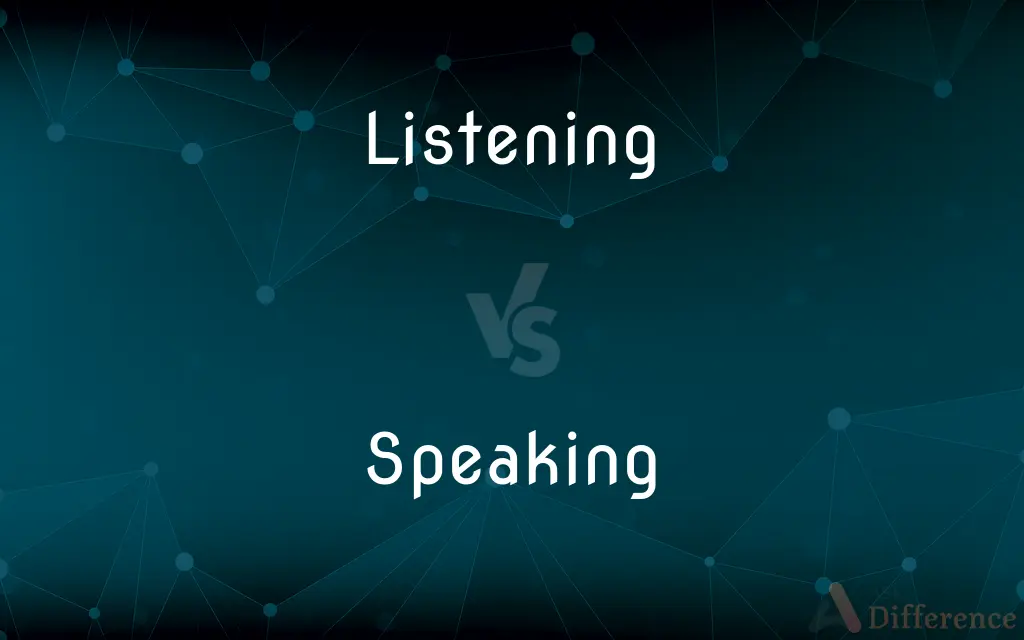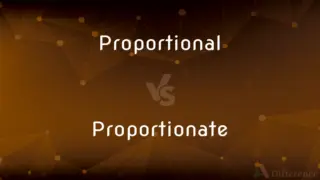Listening vs. Speaking — What's the Difference?
Edited by Tayyaba Rehman — By Maham Liaqat — Updated on April 1, 2024
Listening is the act of receiving and understanding spoken words, while speaking involves expressing thoughts, feelings, or information verbally.

Difference Between Listening and Speaking
Table of Contents
ADVERTISEMENT
Key Differences
Listening is a receptive skill that involves not just hearing sounds but also understanding and interpreting them. It requires focus, attention, and the ability to process and comprehend spoken language. On the other hand, speaking is a productive skill that entails articulating thoughts, feelings, or information through words in a coherent and structured manner. It involves vocabulary, grammar, pronunciation, and the ability to organize thoughts in real-time.
While listening focuses on the receiver's role in communication, emphasizing understanding and interpretation, speaking centers on the sender's role, where the main goal is to convey messages clearly and effectively. For example, an effective listener pays attention to the speaker's words, tone, and non-verbal cues to fully understand the message, whereas an effective speaker ensures clarity, engages the audience, and adjusts their message based on feedback.
Listening skills are essential for effective communication, as they enable individuals to accurately receive and interpret messages, fostering understanding and empathy. Conversely, speaking skills are crucial for expressing oneself clearly and persuasively, allowing for the effective conveyance of ideas and emotions. Both are fundamental to interpersonal communication, but they serve different functions within the communication process.
In educational settings, listening is critical for learning, as students must be able to comprehend instructions, discussions, and presentations to absorb knowledge. In contrast, speaking skills are emphasized in activities like presentations, debates, and discussions, where students are encouraged to articulate their thoughts and knowledge clearly.
Listening can be passive or active, with active listening involving engagement and interaction with the speaker for deeper understanding. Speaking, however, is inherently active, requiring continuous engagement in the process of forming and delivering messages.
ADVERTISEMENT
Comparison Chart
Skill Type
Receptive
Productive
Focus
Understanding and interpreting messages received.
Expressing thoughts, feelings, or information.
Role in Communication
Receiver's role, emphasizing comprehension.
Sender's role, emphasizing clear conveyance.
Key Elements
Focus, attention, interpretation.
Vocabulary, grammar, pronunciation, organization.
Educational Importance
Critical for absorbing knowledge and instructions.
Important for presenting ideas and engaging in discussions.
Compare with Definitions
Listening
Good listening skills are essential for effective communication.
Her listening skills made her an excellent mediator.
Speaking
Mastery in speaking includes good pronunciation, vocabulary, and grammar.
Learning new languages enhanced her speaking skills.
Listening
It involves paying attention to not just words but also tone and non-verbal cues.
She improved her relationship by listening more attentively to her partner.
Speaking
It requires organizing thoughts and using language effectively.
She practices speaking in front of a mirror to improve her articulation.
Listening
Listening can be either passive or active, with active listening requiring engagement.
Active listening during meetings ensures better teamwork and understanding.
Speaking
Speaking allows for the expression of ideas, feelings, and information.
Speaking openly about concerns leads to better solutions.
Listening
Listening is the act of hearing and understanding what someone says.
Listening carefully to the lecture helped him grasp complex concepts.
Speaking
Speaking skills are crucial for persuasive and effective communication.
His speaking abilities helped him succeed in negotiations.
Listening
Listening is fundamental in learning and interpersonal interactions.
Listening to diverse perspectives broadened his understanding of the issue.
Speaking
Speaking involves expressing thoughts or information verbally.
Speaking clearly and confidently makes his presentations engaging.
Listening
To listen is to give attention to sound or action. When listening, one is hearing what others are saying, and trying to understand what it means.
Speaking
Capable of speech.
Listening
To make an effort to hear something
Listen to the radio.
Listen for the bell that ends class.
Speaking
Involving speaking or talking
Has a speaking part in the play.
Listening
To pay attention; heed
“She encouraged me to listen carefully to what country people called mother wit” (Maya Angelou).
Speaking
Expressive or telling; eloquent.
Listening
An act of listening
Would you like to give the CD a listen before buying it?.
Speaking
True to life; lifelike
A speaking likeness.
Listening
Of something or someone that listens.
Any listening person can tell she's lying.
Speaking
Used in speaking.
One's normal speaking voice
Listening
Of something that is used in order to hear or to improve the ability to hear.
He could hear better when he used his listening device.
Speaking
Expressive; eloquent.
The sight was more speaking than any speech could be.
Listening
Of an action that is performed with caution and attention to sounds.
Speaking
Involving speaking.
It was her first speaking part: she screamed.
Listening
Present participle of listen
Speaking
Having the ability of speech.
Speaking parrot; speaking clock
Listening
Action of the verb listening
Speaking
(in compounds) Having competence in a language.
The English-speaking gentleman gave us directions; I travel in Russian-speaking countries; the French-speaking world listened in to the broadcast
Listening
An educational exercise involving listening
OK, students, today we're going to do a couple of listenings about the environment, then a reading about crime.
Speaking
One's ability to communicate vocally in a given language.
I can read and understand most texts in German, but my speaking is awful.
Listening
Skill or ability of perceiving spoken language.
You can improve your listening well by watching English-language films.
Speaking
The act of communicating vocally.
Listening
The act of hearing attentively.
Speaking
An oral recitation of e.g. a story.
Listening
The act of hearing attentively;
You can learn a lot by just listening
They make good music--you should give them a hearing
Speaking
Present participle of speak
Listening
Attending to or alert for sound;
Be wary of listening ears
Government-maintained listening posts
Speaking
(telephone) Indication that the person requested is the same as the one who is currently speaking.
Speaking
Uttering speech; used for conveying speech; as, man is a speaking animal; a speaking tube.
Speaking
Seeming to be capable of speech; hence, lifelike; as, a speaking likeness.
Speaking
The act of uttering words.
Speaking
Public declamation; oratory.
Speaking
The utterance of intelligible speech
Speaking
Delivering an address to a public audience;
People came to see the candidates and hear the speechmaking
Speaking
Capable of or involving speech or speaking;
Human beings--the speaking animals
A speaking part in the play
Speaking
Capable of speech;
The speaking animal
Common Curiosities
How can one improve speaking skills?
Improving speaking skills involves practicing articulation, expanding vocabulary, understanding grammar, and organizing thoughts coherently.
What role does listening play in education?
Listening is fundamental in education for absorbing knowledge, understanding instructions, and participating in discussions effectively.
Why are listening skills important?
Listening skills are crucial for effective communication, understanding, and empathy, allowing for accurate reception and interpretation of messages.
What makes an effective speaker?
An effective speaker clearly articulates thoughts, engages the audience, and adjusts their message based on feedback, ensuring understanding.
Is speaking more important than listening?
Neither skill is more important; both are essential for effective communication, serving different but complementary roles.
How does culture influence listening and speaking styles?
Cultural norms and values can shape how people express themselves and interpret messages, influencing both speaking and listening behaviors.
Can listening be passive?
Yes, listening can be passive, where the listener hears the message without actively engaging or interacting with the content.
What is the difference between listening and speaking?
Listening is about receiving and understanding messages, while speaking is about expressing thoughts or information verbally.
How do non-verbal cues play a role in listening?
Non-verbal cues, such as tone of voice and body language, provide additional context and help in interpreting the speaker's true message and emotions.
Why is active listening considered more effective?
Active listening involves engagement and interaction, leading to deeper understanding, empathy, and effective communication.
Can speaking skills influence career success?
Yes, strong speaking skills can enhance persuasiveness, leadership, and professional relationships, contributing to career advancement.
What are some barriers to effective listening?
Barriers include distractions, preconceptions, lack of interest, and poor communication skills from the speaker.
How can feedback improve speaking skills?
Feedback can highlight areas for improvement, such as clarity, pace, and engagement, helping speakers refine their delivery and message.
Can listening skills affect relationships?
Absolutely, effective listening can lead to better understanding, empathy, and stronger connections in personal and professional relationships.
What is the significance of pronunciation in speaking?
Proper pronunciation ensures clear communication, aiding in the listener's understanding and reducing the likelihood of misinterpretation.
Share Your Discovery

Previous Comparison
Proportional vs. Proportionate
Next Comparison
Valley vs. CanyonAuthor Spotlight
Written by
Maham LiaqatEdited by
Tayyaba RehmanTayyaba Rehman is a distinguished writer, currently serving as a primary contributor to askdifference.com. As a researcher in semantics and etymology, Tayyaba's passion for the complexity of languages and their distinctions has found a perfect home on the platform. Tayyaba delves into the intricacies of language, distinguishing between commonly confused words and phrases, thereby providing clarity for readers worldwide.














































